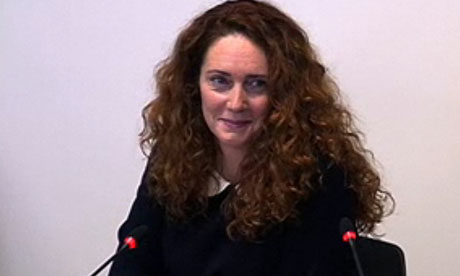 |
|
Rebekah Brooks at Leveson: |
12.44pm: Jay asks if it was important for Brooks to build friendships
with senior politicians.
Brooks says that "some friendships were made" but politicians never
forgot she was a journalist and she never forgot they were a politician.
Did she feel you had personal power over politicians?
"I just didn't see it like that. I saw my role as editor of the Sun as a
very responsible one."
Jay suggests that she was aware of her ability to be empathetic with
people.
"I hope to be empathetic, yes," she says, after Jay reassures her that
he is not suggesting anything sinister.
12.49pm: Brooks is asked about the serialisation in the Sunday Times and
the Sun of a book by Kate McCann, the mother of Madeleine.
Gerry McCann told the inquiry that they were initially "horrified" about
the serialisation, but were later convinced after News International
pledged to back their campaign if they agreed to the serialisation.
Brooks can't remember how much News International paid for the book
serialisation.
"Hundreds of thousands. It wasn't £1m. Half a million maybe?"
She adds: "I had always got on very well with Gerry and Kate McCann. I
think if asked they would be very positive about the Sun. In this case I
thought Dominic Mohan's idea to run the campaign, this review of
Madeleine's case by the home secretary, was the right thing to do … I
don't think I spoke to Theresa May directly. Dominic [Mohan] may have
done."
12.52pm: Brooks says she did not take the McCann issue up with Downing
Street.
Editor Dominic Mohan or Tom Newton-Dunn, the Sun's political editor,
will have spoken to No 10 or the Home Office about reopening the
Madeleine investigation after the Sun's campaign, she says.
Was there an ultimatum or threat to the home secretary?
"I'm pretty sure there will not have been a threat, but you will have to
ask Dominic Mohan," she says.
Jay says he has been told that Brooks intervened personally with the
prime minister and said the Sun would put Theresa May on the front page
every day until the paper's demands were met.
Brooks says that is not true. "I did not say to the prime minister we
would put Theresa May on the front page every day. If I'd had any
conversations with No 10 directly they would not have been particularly
about that," she adds.
12.55pm: Lord Justice Leveson intervenes. He asks whether Brooks was
involved in a strategy to threaten No 10 in order to obtain a review of
the Madeleine investigation.
"I was certainly part of a strategy to launch a campaign in order to get
a review for the McCanns," Brooks says, disputing that it was a
"threat".
Leveson: "Give me another word for it, would you?"
Brooks: "Persuade?"
Leveson appears unconvinced.
12.57pm: Jay suggests the government yielded to Brooks's pressure to
reopen the McCann investigation. "It only took about a day," he notes,
drily.
Brooks insists that this was a worthwhile campaign.
1.01pm: Jay asks about Dominic Grieve, the former shadow home secretary.
Over dinner, Brooks once spoke to him about the Human Rights Act (HRA).
He was in favour of it and she was not, Jay says.
Brooks says Grieve believed the Tory pledge to replace the HRA with a
British bill of rights "should not be so easily promised".
The dinner conversation was "quite heated" as he did not toe the party
line on the future of the act, she says.
"I did not tell Mr Cameron to move him," Brooks says, pressed by Jay.
"They [Grieve's shadow cabinet colleagues] were concerned that his view
was not to be taken seriously."
Brooks maintains she did not give Cameron any advice on Grieve. Cameron
and Osborne were "at pains" to tell Brooks that Grieve was mistaken and
that he did not share that view, she adds.
1.03pm: The inquiry has now broken for lunch and will resume at 2pm with
more evidence from Brooks. |


